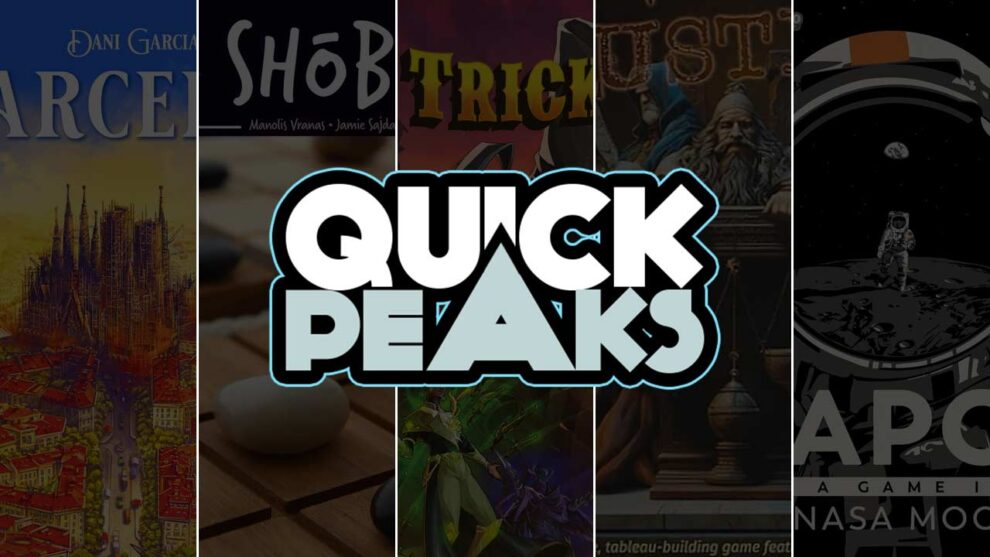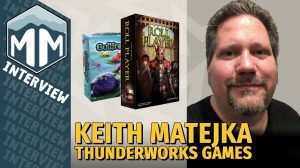Barcelona – David McMillan
For the longest time, Barcelona was a city behind walls. But, the population explosion has started making things uncomfortable. The age of medieval siege is long gone and it’s time for the walls to come down so the city can expand.
The game of Barcelona drops the players into the mid-19th century during the titular city’s new expansion. As the game begins, the city is little more than a blueprint composed of building plots, the roads running alongside them, and the intersections where these roads meet. Each of these roads has an action associated with it. On their turns, players draw citizen tiles out of a bag and then place them in a stack onto one of the unoccupied intersections to perform the actions associated with the roads, build things, and score points. And that’s the ultimate goal: score the most points.
My first play of Barcelona sent me back to the rulebook a few times to clarify a few things we encountered along the way, but we didn’t run into any major issues. The game was a lot of fun and it was exciting watching the city spring to life as the game wore on. I left that first game with a good feeling and I am looking forward to revisiting it again soon.
Keep an eye out for my eventual review!
Ease of entry?:
★★★☆☆ – There were a few questions
Would I play it again?:
★★★★★ – Will definitely play it again
Read more articles from David McMillan.
SHŌBU – Tom Franklin
I love a good abstract strategy game, and SHŌBU has been on my watchlist ever since my colleague Kurt Refling wrote his excellent review of SHŌBU and it’s design elements. Recently, I picked up a copy and got it to the table that same day.
I was not disappointed.
SHŌBU strikes that wonderful balance between rules that are simple enough to grasp, while giving you a feel for the depth and complexity of the gameplay within the first few moves. The back and forth/push and pull of your movements and those of your opponent makes for a tense struggle, one that’s just long enough to burn some brain cells and just short enough to say, “Let’s play that again” at the end of each game.
SHŌBU immediately goes into heavy-rotation with my two-player abstract games—and also goes to the top of my “What took me so long to buy this game?” list.
Ease of entry?
★★★★☆ – The odd bump or two
Would I play it again?:
★★★★★ – Will definitely play it again
Read more articles from Tom Franklin.
Trickdraw – Justin Bell
Trickdraw is a race to score 10 points before your tablemates. On a turn, players must draw a single card, then decide whether to play a card facedown in their play area (worth one point) or play a card face-up for its power, which is often doing things like flipping other player cards or discarding cards to draw more cards.
There’s one other way to win Trickdraw: be the first to play two of the three instant-win cards in the 72-card deck face-up. (You see where this is going.)
My wife and I set up a two-player game. 60-second teach, thanks to the back-of-the-manual player aid. On her fourth turn, she played one of the three instant win cards, which created a tense moment—what if she has one of the other two instant win cards? On my fourth turn, I played a card that flipped her first instant win card face-down. On her next turn, she reversed my previous turn, flipping that instant winner face-up. One turn after that, she top-decked a second instant win card and won.
Trickdraw has good intentions. But a win condition like this ended our game on a sour note. To the game’s credit, it promises that play will sometimes be tricky (hence the name, not the fact that it is a trick-taker!). And it only took nine minutes (!!!) to teach and play our game. But the play wasn’t interesting, and I know that won’t change with future plays.
Ease of entry?:
★★★★★ – No sweat
Would I play it again?:
★★☆☆☆ – Would play again but would rather play something else
Read more articles from Justin Bell.
Justice – Andrew Lynch
I would have told you it was impossible to create a trick-taking game that manages to feel like multiplayer solitaire, and yet, here we are. Justice ambitiously marries trick-taking with a sort of communal tableau builder and hidden roles. It’s a fun idea, but none of it shines.
The winner of each trick picks a card to end to either the Guilty or Not Guilty side of one of the round’s three suspects. Icons on the cards will give votes in one direction or the other more sway, and the side with the greater count wins out. At the end of the round, you find out the truth, and players score points depending on whether they want the innocent found innocent, the guilty found guilty, the innocent condemned, or the guilty set free.
The problem is that Justice offers little in the way of decisions. A trick-taking game where roughly half the deck doesn’t come into play is already on shaky ground. Perfect information and an increasingly acute sense of certainty play a large role in why trick-takers are fun, but you won’t find that here. The hidden roles and scoring bonuses don’t push players to make surprising decisions, so we’re left with what this is: a deflated trick-taking game with overly complicated end-of-round scoring. I respect the swing, but it’s a whiff.
Ease of entry?:
★★★★☆ – The odd bump or two
Would I play it again?:
★★☆☆☆ – Would play again but would rather play something else
Read more articles from Andrew Lynch.
Apollo: A Game Inspired by NASA Moon Missions – Andy Matthews
Apollo: A Game Inspired by NASA Moon Missions (hereby shortened to Apollo) is a cooperative game that takes players back to the glory days of human space travel; when the excitement about sending men into space, and to the moon, was at its peak. In Apollo one player acts as Mission Control, while the remaining players become astronauts. Offering multiple missions, the game asks players to accomplish a set of tasks in a timed environment. Using dice for actions players roll, and reroll, in an effort to get specific dice rolls which will allow them to direct the ship, affect repairs, and complete experiments, all within a 4 minute clock (or less in advanced missions).
While the game is very well produced with multiple layer boards, high quality components, and fantastic artwork, the game just isn’t that fun. There’s a lot to set up, with different pieces going to the astronauts, and other pieces going to Mission Control. Because the rounds are timed, players are often forced to make suboptimal choices simply to move things along. And that’s not counting the fact that you start off with fewer dice than you need to achieve all the goals. And that means in each round you’re taking damage against one ship’s system or another. Combining damage with the fact that your spaceship is inexorably moving forward towards the end of the mission and things get hectic (which in our case meant no fun).
If you end up playing this game I suggest taking the timer off the table for the first few rounds. This will let players figure out the mechanics without feeling super stressed. While I don’t mind pressure in games, I don’t enjoy being rushed, and that’s what this feels like…rushing simply for the sake of it.
Ease of entry?:
★★☆☆☆ – Not an easy onboard
Would I play it again?:
★☆☆☆☆ – Would play again but will cry about it














Well… Apollo was disappointing. I was hoping for better. A couple of the others seem like they are worth checking out.
You guys are wonderful! Keep up the good work.
If you like abstracts, SHOBU is definitely worth checking out. My fellow reviewer, Kurt, did an in depth review of the game a few years ago: https://www.meeplemountain.com/reviews/shobu/